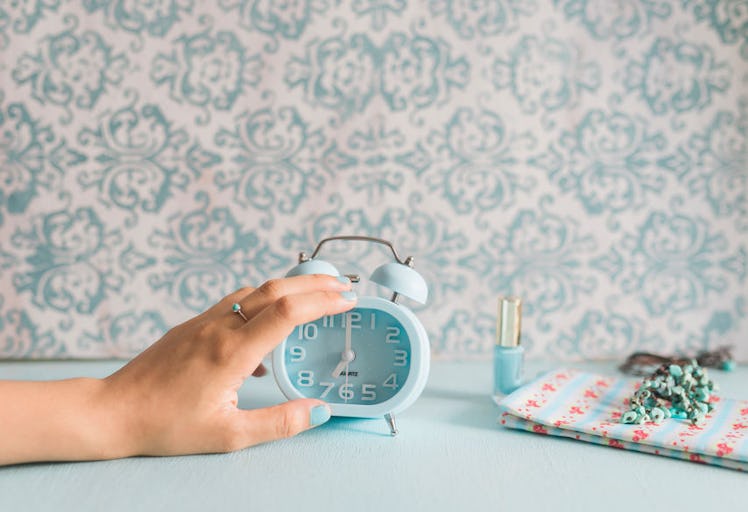
Here's Why Sleep Experts Say Waking Up Before Your Alarm Is Actually A Good Thing
From time to time come the mornings when you wake up, rather magically, without an alarm. Your body somehow rises on its own without the incessant beeping of some annoying ringtone (which you only picked out because you thought it would be less irritating to wake up to), and it seems like nothing short of a miracle. Perhaps you are a lucky creature to whom this happens regularly, but that basically just means you're a unicorn, IMO. So what does waking up before your alarm actually mean? Is it a good sign for your sleep health, or does it mean you're not getting the deep rest you really need?
Well, as it turns out, waking up long before the rooster sounds, so to speak, can happen for a lot of different reasons — one of them maybe being a perfect night of rest. Dr. Sujay Kansagra, director of Duke University’s Pediatric Neurology Sleep Medicine Program and sleep health expert for Mattress Firm, tells Elite Daily that waking up before your alarm clock goes off isn't necessarily abnormal, but it can sometimes indicate sleep disruption. "Even in our deep sleep (REM sleep), our brain can be very active and disruptions like noise or light can easily wake us up and disturb our snooze," he says. And if you're having a restless sleep in general, Kansagra adds, that can result in waking up long before your alarm sounds, too.
On the other hand, having no need for a wake-up call can also mean your body has gotten all the rest it requires for the night, and that it's ready to be up and at 'em whenever your eyes naturally flutter open. According to Dr. Benjamin Smarr, a National Institutes of Health postdoctoral fellow at UC Berkeley and Reverie sleep advisory board member, this is definitely a good thing. “Waking up naturally is [healthier] because you let your body and brain finish doing maintenance before putting yourself back on the road," he tells Elite Daily over email. Plus, he says, assuming you weren't tossing and turning throughout the night, waking up before your alarm is likely a good sign that you're not accumulating sleep debt, aka the effects of not getting enough sleep.
In fact, if your body doesn't already naturally wake up on its own before your alarm, Dr. Smarr recommends literally training your body to do exactly that — which, yes, sounds like a lot of work, and will probably entail some major habit-breaking, but it's definitely not impossible. "The first way to try to wake up without an alarm clock successfully is to go to bed earlier, remembering that you're giving up night hours to invest in higher-quality, higher-performance day hours the next day," Smarr tells Elite Daily. "Stop using bright lights, especially devices, at least an hour before your bedtime. The light fools your brain's clocks into thinking it's daytime, and so reduces your natural sleep pressure, keeping you up later than your body intended."
Instead, he says, use that tech-free hour or so before bed to build a ritual of slowing down, brushing up, and getting into a mental space where you can sleep more easily. The thing is, Smarr explains, if you want to wake up without an alarm on a regular basis, you have to stick to a pretty consistent sleep schedule. And yes, that means going to bed at roughly the time every single night — not crashing at 1 a.m. on Tuesday night and 9 p.m. Wednesday night. Sticking to a consistent schedule will help you balance your circadian rhythm, says Dr. Kansagra, which is basically your body's internal clock that responds to sources of light and dark in your environment, and dictates when you're awake or asleep. "By sticking to a schedule, waking up at the same time weekdays and weekends, your brain will essentially act as an internal alarm clock minus the snooze button," he tells Elite Daily.
While most adults need about seven to nine hours of sleep each night, if you want to figure out exactly how much rest is good for your body so you can train yourself to wake up without an alarm, the National Sleep Foundation says your best bet is to experiment with different sleep times to see what feels best for you. If you know you're already going to bed too late, try to move your bedtime earlier in 10- or 15-minute increments, so your body's not too shocked by the sudden change. Pretty soon, you'll find your sleepy sweet spot.